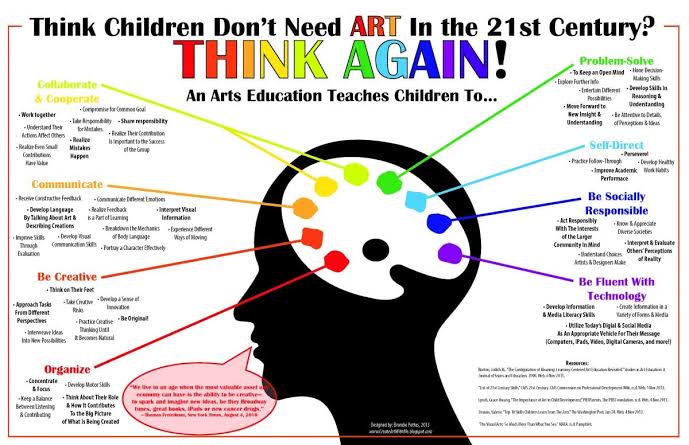Discover the transformative benefits of arts education in Nigeria, from fostering creativity and critical thinking to preserving cultural heritage and promoting social-emotional development. Explore how arts programs enrich students' lives and contribute to a more inclusive and culturally vibrant society.
Arts education plays crucial role in shaping holistic development of individuals. It fosters creativity critical thinking. It also nurtures cultural appreciation. In Nigeria, rich cultural heritage coexists with artistic traditions. Arts education here holds particular significance. This article explores various benefits of arts education in Nigeria. We examine its impact on personal growth. We also study academic achievement. Furthermore we consider its role in societal enrichment.
Introduction to Arts Education in Nigeria
Arts education encompasses wide range of disciplines. These include visual arts music, dance drama and literature. In Nigeria, these artistic forms are deeply embedded in country's diverse cultures and traditions. They reflect creativity and expressive nature of its people. Arts education not only nurtures artistic talent. It also cultivates essential skills and competencies valuable in both academic and professional contexts.
Promoting Creativity and Innovation
One of the primary benefits of arts education is its ability to foster creativity and innovation among students. Engaging in artistic activities such as painting sculpting and storytelling encourages individuals to explore new ideas. Experiment with different techniques. And think outside the box. This creative process is essential for problem-solving and innovation in various fields, from science and technology to business and entrepreneurship.
Moreover, arts education encourages students to express themselves authentically and develop their unique artistic voice. By encouraging self-expression and imagination, arts programs empower students to discover their passions and pursue their artistic interests with confidence.
Enhancing Critical Thinking and Analytical Skills
Arts education promotes critical thinking and analytical skills by challenging students to interpret, analyze, and critique artistic works. Studying literature, for example, teaches students to analyze themes, characters, and narrative techniques, fostering a deeper understanding of human experiences and societal issues. Similarly, studying visual arts and music encourages students to observe, interpret, and evaluate artistic techniques and aesthetics.
Furthermore, engaging in creative processes such as composing music or choreographing dance routines requires careful planning, problem-solving, and attention to detail. These skills are transferable to academic subjects and real-world situations, equipping students with the ability to approach challenges with a critical and analytical mindset.
Cultural Preservation and Heritage
Arts education plays a vital role in preserving and promoting Nigeria's rich cultural heritage. Through arts programs, students learn about traditional arts and crafts, folk music and dance, indigenous languages, and oral storytelling traditions. This cultural immersion fosters a sense of pride and appreciation for Nigeria's diverse cultural identities and traditions.
Moreover, arts education helps bridge generational divides by passing down cultural knowledge and traditions from older to younger generations. By preserving cultural heritage through arts education, Nigeria can safeguard its cultural identity and promote intercultural dialogue and understanding among its diverse population.
Promoting Social and Emotional Development
Arts education contributes to the social and emotional development of students by promoting empathy, collaboration, and communication skills. Collaborative artistic projects such as theater productions, musical ensembles, and community art initiatives encourage teamwork and cooperation among students from different backgrounds. These collaborative experiences teach students to respect diverse perspectives, negotiate conflicts, and work towards common goals.
Furthermore, arts education provides a platform for students to explore and express complex emotions and experiences. Engaging in artistic activities such as painting, writing poetry, or performing music allows students to process and articulate their feelings in a constructive and meaningful way. This emotional outlet promotes mental well-being and resilience, helping students cope with stress and develop positive coping strategies.
Academic Achievement and Personal Growth
Research has shown a positive correlation between arts education and academic achievement. Students who participate in arts programs often demonstrate higher levels of engagement, attendance, and academic performance in other subjects. The skills acquired through arts education, such as discipline, persistence, and attention to detail, contribute to academic success and lifelong learning.
Moreover, arts education nurtures holistic development by addressing the intellectual, emotional, and social dimensions of learning. By integrating arts into the curriculum, schools create a well-rounded educational experience that prepares students for success in both academic and professional pursuits.
Challenges and Opportunities
Despite the numerous benefits of arts education, challenges such as limited funding, curriculum prioritization, and access to trained arts educators persist in Nigeria. Addressing these challenges requires sustained investment in arts infrastructure, advocacy for arts education policies, and professional development opportunities for teachers.
Furthermore, leveraging technology and digital platforms can expand access to arts education resources, particularly in remote and underserved communities. Initiatives that promote community engagement, cultural exchange, and interdisciplinary collaboration can also enrich arts education programs and enhance their impact on students' lives.
Conclusion
In conclusion, arts education plays a vital role in Nigeria's educational landscape by promoting creativity, critical thinking, cultural preservation, and social-emotional development among students. By investing in arts education, Nigeria can harness the transformative power of the arts to empower individuals, celebrate cultural diversity, and foster a more inclusive and prosperous society. Embracing arts education as a cornerstone of holistic learning will contribute to the overall well-being and educational attainment of Nigeria's future generations.
